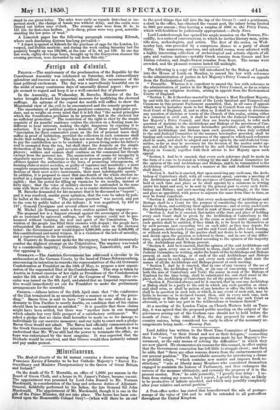,furtigu nub tulatial.
Flares.—The anniversary of the proclamation of the Republic by the Constituent Assembly was celebrated on Saturday, with extraordinary splendour and success as a spectacle, and without the occurrence of the least political excitement. The day was a marvellously beautiful one in the midst of many continuous days of unusually dismal aspect : the peo- ple seemed to regard and keep it as a well-omened day of pleasure.
- In the Assembly, on Wednesday, M. Baroche, Minister of the In- terior brought forward his important measure for modifying the electoral suffrage. An epitome of the expose des motifs will suffice to show the Ministerial view of the evil to be encountered and the remedy proposed.
The uncertainty of political position paralyzes commerce, depreciates pro- duce, and so weighs on every mind that it is felt that "the sacred princi les which the Constitution proclaims in its preamble find in the electoral law no sufficient protection." The restriction of the right to elect by the simple requisite of six months' residence centres the election on a floating mass in- different to local interests, making the right dangerous by exposing it to seduction. It is proposed to require a domicile of three years' -habitation ; "inscription for three consecutive years on the list of personal taxes shall suffice as proof of habitation, provided the collectors in each commune shall decide that nothing is due." This does not mean that they who are not able to pay the contribution are to be excluded : a person living under his father's roof is exempted from the tax, but shall share the domicile on the simple declaration of the father ; paid servants shall share the domicile of their em- ployers ; soldiers and seamen shall continue on the communal list though exempt from the personal tax. The enumeration of causes for incapacity is singularly narrow : the statute is silent as to persons guilty of rebellion, of offences against the authorities or the laws, of promoting attroupemens, of forming clubs or secret societies, or guilty of vagrancy and mendieity a more complete enumeration must be enacted ; "thus you will have deprived the factions of their most active instruments, their most indefatigable agents." In addition, it is proposed to enact that one-fourth of the whole electors in- scribed in a department must vote tteliftdce the election valid, instead of one- eighth ; that the ppeeriod for filling up vacancies be six months, instead of forty days; that the votes of military electors be confounded in the same urns with those of the other electors, so as to render distinction impossible.
M. Baroche demanded for his measure that it be discussed as "urgent" ; and it was resolved, amidst great agitation, that the vote be taken by pub- lie ballot at the tribune. " The preiious question" was moved, and put to the vote by public ballot at the tribune : it was negatived, by 453 to 197 ; General Cavaignac and several others not voting.
M. Michel (de Bourges) made a fiery oration against the urgency— The proposed law is a flagrant attempt against the sovereignty of the peo- ple as exercised by universal suffrage, and the urgency could not be pro- nounced without violating the text and spirit of the Constitution. The wisdom of the people has filled their enemies with despair; the people have relinquished the musket and cartridge, and relied only on the electoral ticket: the Government now Would depnve' 3,000,000, BOW say 6,000,000, of this constitutional and moral weapon. it is a -violation of the laws of morality, and a reprovocation to the barricades. M. Gustave de Beaumont spokefor the urgency; but would strenuously combat the slightest attempt on the Constitution. The ur Orley was'voted by a considerable majority ; Generals Cavaignac, Limoritiere, and Ea-
sier opposing it .
GERMANY.,—The AusiziamGoverninant h,sis _addressed a circubir to its ambassadors at the German Courts, by the hand of Prince Schwarzenberg, announcing its intention-to ebneake the representatives of the cad Germanic Confederation at Frankfort on the 10th of May, to propose a now organi- zation of the superseded Diet of theConfederation. This step is taken by Austria in formal exercise of her right as Presidium of the-Confederation under the 5th article of the act 57 of the Congress of Vienna. Her cir- cular was issued on the 6th April, and stated that an Imperial representa- tive would immediately set out for Frankfort to make the preliminary arrangements for the assembly. Gnmion.—Athens letters of. the 24th April state that " the &inference of the 21st terminated in as unsatisfactory a manner as any of the prece- ding." Baron Gros is said to have " increased the sum offered as in- demnity to Don Pacifico to nearly double, on condition that all his elaims should then be considered as satisfied." It is possible that these claims might have been settled, but there was " another item in our demand which. admits but very MHO prospect of a satisfactory settlement." We asked a pledge that no claim shall hereafter be made on us for damage to individualii by our coercive measure-SI and our right to exact such a pledge Baron -Gros 'Would not' dmit The Baton had officially communicated to the Greek Government that his mission- was ended ; and though it was -Understood that Mr: Wyse still had the power to terminate the affair, no tope was entertained by -the host sangtine. It was expected that the blockade would be renewed, and that Greece would then instantly submit and pay under protest.


























 Previous page
Previous page